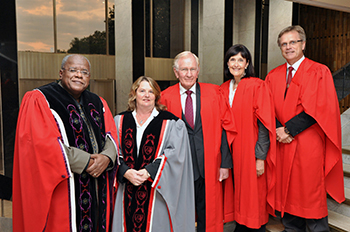Latest News Archive
Please select Category, Year, and then Month to display items
03 October 2024
|
Story Ansie Barnard
|
Photo Supplied
 From left to right: Londeka Mkhwanazi, Semither Mkhize, Salima van Schalkwyk, Slindokuhle Ndlovu, Asanda Mpinga, Mantombi Molefe, Ntombinkulu Khumalo, Mosebjadi Chauke and Thembinkosi Mkhwanazi.
From left to right: Londeka Mkhwanazi, Semither Mkhize, Salima van Schalkwyk, Slindokuhle Ndlovu, Asanda Mpinga, Mantombi Molefe, Ntombinkulu Khumalo, Mosebjadi Chauke and Thembinkosi Mkhwanazi.
The Amrut Foundation, in partnership with the University of the Free State (UFS), successfully hosted its Inaugural Innovathon at the UFS Qwaqwa Campus. This competition is designed to identify and support innovative products and services that not only generate profit but also contribute to the public good, with a strong emphasis on ethical business practices. Through this collaboration, students gain national exposure for their businesses and receive support to create sustainable social enterprises.
Five teams of student social entrepreneurs from the Qwaqwa campus were shortlisted to participate in the regional finals. Their selection was based on ventures that adhered to a social entrepreneurship model and demonstrated plans for long-term profitability and sustainability.
During the Innovathon, a panel of judges from the UFS, the Amrut Foundation, and the Small Enterprise Development Agency (SEDA) selected two outstanding teams to represent the UFS at the national finals, which will take place in October. The winning ventures, Biofly-Pro and Root Rescue were each awarded R20,000 to further develop and expand their initiatives.
Hemang Desai, Executive Director of the Amrut Foundation, expressed his enthusiasm for the event: "Amrut is proud to co-host the Free State leg of the inaugural Innovation Challenge with the UFS. Supporting students with entrepreneurial ambitions that align with societal care is one of our key focus areas."
Dr Grey Magaiza, Senior Lecturer and Deputy Director for the Centre for Gender and Africa Studies at the UFS, highlighted the importance of social entrepreneurship: “Social entrepreneurship is a collaborative effort towards creating sustainable and ethical business processes. The two winning projects embody these principles, and we look forward to their continued growth. In line with our Vision 130, social entrepreneurship can serve as a critical lever for university-community engagement.”
Congratulations to Biofly-Pro and Root Rescue on their well-deserved achievements!
Wrongful suffering must be compensated, Prof Johann Neethling argues
2016-04-20

From the left are Prof Jonathan Jansen, Vice-Chancellor and Rector, Prof Caroline Nicholson, Dean of the Faculty of Law, Prof Neethling, Prof Rita-Marie Jansen, Vice-Dean, and Dr Brand Claassen, Head of the Department of Private Law.
Photos: Stephen Collett
|
On 11 April, the Faculty of Law held the first of the year’s series of Prestige Lectures presented by Prof Johann Neethling, Senior Professor in the Department of Private Law. The event was attended by senior faculty members, the Dean of Law Prof, Caroline Nicholson, and the Vice-Chancellor and Rector, Prof Jonathan Jansen.
In his opening remarks, Prof Jansen said “Prestige lectures are at the heart of a university’s academic endeavour. It would serve the university community well to present them more often, as they go to the heart of important issues that affect society”
Prof Neethling made a compelling case for compensation for wrongful suffering by a child born with impairments. Since the mid-1960s, the actions of wrongful conception and wrongful birth have been recognised in South African law. Wrongful conception is defined as when a healthy child is born as a result of failed sterilisation or abortion, and wrongful birth is when a doctor fails to inform parents of a disability before the birth of their child.
“The reality is that a child born with impairments may indeed suffer (sometimes extreme) pain, loss of amenities of life, which would justify an award of damages,” he said.
So far, the action for wrongful suffering has been dismissed by the High Court and the Supreme Court of Appeal. However, he highlighted several cases where wrongful conception and wrongful birth was recognised by the courts.
“Why can the same approach (for wrongful conception and wrongful birth) not be followed in wrongful suffering claims by accepting that a disabled child seeks to address the consequences of its birth?” he asked.
Prof Neethling is regarded as one of the greatest minds in Private Law, not only in South Africa but in the African continent.
A festschrift, Essays in Honour of Johann Neethling (2015), with contributions from more than 50 of his peers around the world, was also launched at the lecture.